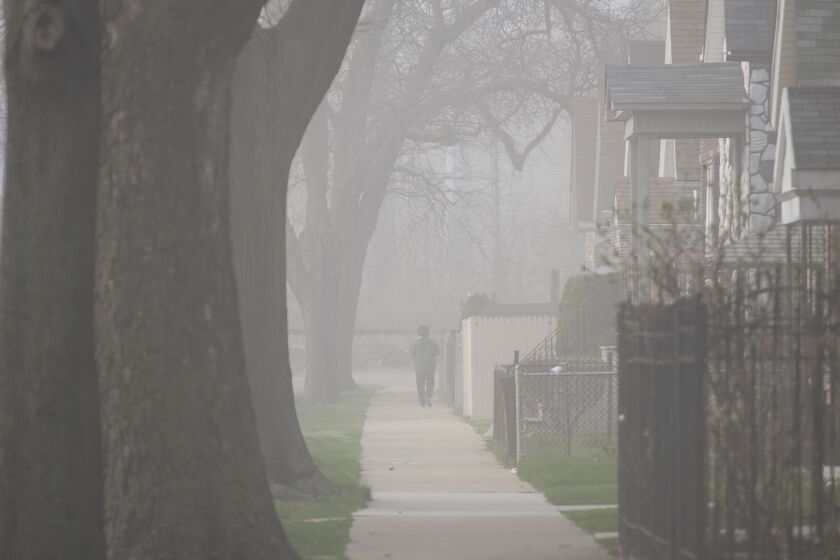Hours after taking office, Mayor Lori Lightfoot signed an executive order stripping aldermen of their unbridled control over licensing and permitting in their wards.
On Saturday, the mayor’s decision to start delivering on the central promise of her corruption-fighting mayoral campaign came back to haunt the residents of Little Village, several aldermen now say.
Armed with a city demolition permit that local Ald. Mike Rodriguez (22nd) said he was powerless to block, a subcontractor hired by Hilco Redevelopment Partners demolished a 95-year-old smokestack at the site of a shuttered coal-fired power plant without abiding by the safety measures it had promised to implement.
That caused a giant plume of dust to rain down on the area, potentially creating a public health hazard in the middle of the coronavirus pandemic. Homes, vehicles, streets and sidewalks were left filthy.
On Tuesday, Rodriguez said he would have delayed the smokestack demolition if he could have and twice tried to do just that, only to be told by the city the project would proceed.
He now plans to introduce an ordinance requiring so-called “special-use permits” from the Zoning Board of Appeals before future large-scale demolitions.
“In that special-use permit, there will be much more strict guidelines and much more community engagement and aldermanic power,” said Rodriguez, who lives five blocks from the demolition site. “I ran a non-profit organization for eight years. We were about organizing community members to take power. That’s what we need to empower here.”
Aldermen Brian Hopkins (2nd) and Byron Sigcho-Lopez (25th) couldn’t agree more.
They argue that Lightfoot’s decision to consolidate permitting power in the mayor’s office means she “owns” the Little Village debacle as much as she said Hilco does.
Hopkins noted that during his first-term as alderman, he presided over “one of the most extensive demolition projects” in Chicago’s history — on the site of the Lincoln Yards project. That demolition included: Finkl Steel; a 100,000 square-foot fleet maintenance facility with more than 20 underground storage tanks filled with hazardous chemicals; a rubber recycling company; a tannery, and a variety of other large industrial structures.
“I was consulted every step of the way. Involved in the decision-making process. The dust mitigation, the environmental remediation, scheduling it at a time when it would be less disruptive to the neighborhood,” Hopkins said Tuesday. “Contrast that with the way the city handled aldermanic involvement in this. Alderman Rodriguez was merely notified at the last minute. He wasn’t told he had veto authority. He wasn’t asked for permission. He was simply informed this was happening. It’s the exact opposite of what I went through.”
When Chicago finally returns to some semblance of normality, Hopkins said, he hopes aldermen will take back their permitting powers.
“An alderman knows that he [or she] will be held responsible for negative consequences of any decision like this. So an alderman is going to approach it much more cautiously. ... We use our aldermanic authority to protect neighborhoods. That’s been taken away from us,” Hopkins said.
“When the COVID-19 crisis subsides and there’s no longer such extreme justification for mayoral authority to be solely concentrated in the hands of one person, we should go back to the way it’s always been in Chicago, where the people who are elected by and accountable to the neighbors are making decisions.”
Sigcho-Lopez argued Lightfoot’s decision to “centralize power” has had “unfortunate and shameful consequences” in Little Village. The same could happen with a concrete plant he opposes in his own ward.
“She can try to point fingers all she wants. But at the end of the day, the departments issued the permit in the first place. She has to own this as much as Hilco owns this,” Sigcho-Lopez said.
The mayor’s office advised Hopkins and Sigcho-Lopez to “re-orient themselves with the facts” before trying to “politicize” the Little Village controversy.
In a statement Tuesday afternoon, Lightfoot’s administration noted “nothing about the building code was changed” by the mayor’s executive order, nor did it “change any demolition practices at the Department of Buildings.” In fact, the Municipal Code “still requires that aldermen receive a 10-day notice period, which allows them to raise any concerns about potentially permitted activity,” the statement said.
The mayor’s office noted: work on the Little Village site began two years before Lightfoot took office; Hopkins was “among the 41 aldermen who supported” Hilco’s warehouse project; and Sigcho Lopez campaigned on “his support of repealing aldermanic prerogative.”
The statement further noted Rodriguez was “heavily involved with the developer, including the CEO of the company, as well as other city departments multiple times” before Saturday’s demolition.
It concluded: “It is simply shameful for politicians like Aldermen Hopkins and Sigcho-Lopez to pontificate about a tragic incident in which people were traumatized all to try to score cheap political points. Their uninformed statements speak volumes about their character and their shameless quest for recognition at someone else’s expense.”





